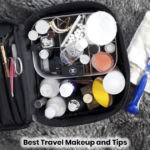Taking good care of our skin is more important than ever in the hectic world we live in today. Choosing the best skincare product could be difficult given the wide range of options available today. This article offers 25 essential criteria for choosing the best skincare products based on your requirements and preferences in order to assist you in making well-informed choices. This article will teach you how to create a skincare regimen that works for your skin type and brand.
25 Tips for Picking Skincare Products in 2024
To help you successfully navigate the skincare product industry in 2024, we provide 25 practical tips. To ensure that your skincare selections are in accordance with your specific needs and objectives, we will cover a wide range of topics, from identifying your skin type and concerns to deciphering ingredient labels and researching the most recent advancements. By factoring these recommendations into your decision-making, you can create a thorough and effective skincare regimen that nurtures and enhances your skin’s inherent beauty.
Understanding Your Skin Type
Knowing your skin type is the first step in creating an efficient skincare program. It helps you choose the best products to suit the particular needs of your skin. There are five types of normal skin: dry, oily, combination, sensitive, and normal. Let’s look at each in greater detail:
Ordinary Skin
Normal skin is well-balanced and has a healthy oil-to-water ratio. It’s not very oily or dry. Normal skin has an even tone, tiny pores, and a smooth texture.
Recommended Products: People with normal skin can use a variety of skincare items without having to worry about their skin being overly oily or dry.
Dry Skin
Dry skin lacks adequate moisture, which frequently causes a tight or flaky feeling. Dry skin has a tendency to be rough, dull, and may have more obvious fine wrinkles. Products with nourishing oils, thick moisturizers, and hydrating cleansers can all help dry skin.
Oily Skin
Sebum produced in excess by oily skin gives it a shiny appearance and makes it more prone to acne. Oily skin has bigger pores and is more likely to break out. Products with components like salicylic acid, mild moisturizers, and oil-free or gel-based cleansers are all recommended for controlling oiliness.
Combination Skin
Combination skin has parts that are both oily and dry. The cheeks could be dry, compared to the T-zone’s tendency to be oilier (forehead, nose, and chin).
Characteristics: Combination skin necessitates a balanced skincare regimen to handle several issues.
Recommended Products: Combination skin might benefit from gentle cleansers, non-comedogenic moisturizers, and focused treatments for particular areas.
Sensitive Skin
Sensitive skin has the traits of being readily irritated and reacting to certain products or environmental elements.
Symptoms: Redness, itching, and burning feelings are common in those with sensitive skin.
Recommended Products: For sensitive skin, mild, hypoallergenic, and fragrance-free skincare products work best.
Know Your Skin Type
Knowing your skin type is the first step in creating a customized skincare routine that takes into account the specific needs of your skin. You can attain a healthy and beautiful complexion by selecting products that are specifically formulated for your requirements. Keep an eye on your skin’s health on a regular basis because your skin type might vary over time due to things like weather, stress, and hormone changes. If you’re unclear of your skin type or need expert guidance on the skincare products that will best serve your particular needs, you should also speak with a dermatologist.
Understanding Your Skin Issues

To choose the best skincare products for your individual needs, it is essential to understand your skin troubles. Following are some typical skin issues and how to spot them:
Wrinkles and fine lines
Signs: Around the mouth, forehead, and eyes are common places for fine lines and wrinkles to emerge as thin, shallow lines or deeper creases on the skin. Causes: Causes of fine lines and wrinkles include aging naturally, exposure to the sun, and decreased collagen formation.
Skincare Strategy: To minimize the appearance of fine lines and increase skin suppleness, look for products that contain anti-aging chemicals like retinol, peptides, and hyaluronic acid.
Dark-colored spots and hyperpigmentation
Hyperpigmentation, often known as black spots, are areas of skin that stand out from the surrounding skin tone by appearing darker. Hormonal changes, acne scars, sun exposure, and inflammation are some of the causes of black spots.
Look for skincare products that contain ingredients like vitamin C, niacinamide, and alpha hydroxy acids (AHAs) to get rid of dark spots and even out skin tone.
Breakouts and blemishes
Pimples, blackheads, whiteheads, and occasionally bothersome cysts on the skin are some of the signs and symptoms of acne.
Excessive oil production, clogged pores, bacteria, and hormonal fluctuations can all contribute to acne.
Use skincare products with salicylic acid, benzoyl peroxide, or tea tree oil to treat acne and prevent new outbreaks.
Rheumatoid Arthritis and Sensitivity
Indications: The visible symptoms of redness and sensitivity include skin irritation, inflammation, and a flushed appearance.
Causes of sensitive skin reactions include environmental variables, particular chemicals, and skin conditions like rosacea.
To lessen redness and irritation, use relaxing ingredients like chamomile, aloe vera, and ceramides in soft, fragrance-free skincare products.
Dry skin and dehydration
Tightness, grit, and flakiness are symptoms of dry skin. Lack of moisture damages the skin barrier and results in dry, dehydrated skin. Buy hyaluronic acid, glycerin, and ceramide-containing products to hydrate and repair the skin’s moisture barrier.
A drab and uneven texture:
Skin with an uneven texture exhibits rough, bumpy, or dull appearances. An accumulation of dead skin cells, UV ray damage, and pollution are the main causes of a dull complexion. Exfoliate frequently using moderate chemical exfoliants like AHAs and BHAs to promote skin renewal for a smoother, more luminous complexion.
Your skin issues can be effectively treated with the right skincare products and procedures by precisely diagnosing them. Remember that there is no one-size-fits-all approach to skincare, so select items that are in line with your skin’s unique requirements. Additionally, it’s important to follow a regular skincare routine and exercise patience because noticeable effects might not show up right away. Consult a dermatologist or skincare expert to develop a customized strategy for healthier, more youthful skin if you’re unsure about your skin conditions or need specific assistance.
Understanding Your Sensitivities and Allergies
Knowing your sensitivities and allergies is essential for keeping your skin healthy and avoiding negative reactions to skincare products. Here are some tips for recognizing and treating your allergies and sensitivities:
Identification of Allergic Reactions:
Common Symptoms: Allergic reactions can cause skin rashes, hives, itching, swelling, and redness.
Triggers: Specific elements in skincare products, such as scents, preservatives, or specific botanical extracts, might cause allergies.
Patch test: Perform a patch test on a small area of skin before using a new product on your entire face. This aids in the detection of probable allergens without generating generalized annoyance.
Knowing Your Sensitivities:
Skin sensitivity is different from an allergy and can cause moderate itching or discomfort when exposed to specific goods or environmental elements.
Compounds that can induce sensitivity:
Some compounds, such as retinoids and alpha-hydroxy acids (AHAs), might make some people sensitive, especially when used in high quantities or when coupled with other potent treatments.
Product label reading:
Look for the term “hypoallergenic.” Products with this designation are designed to reduce the likelihood of allergic responses. New goods should always be patch tested, especially if they make a claim to be hypoallergenic.
Avoiding Known Triggers:
If you are aware of particular compounds that set off allergies or sensitivities, stay away from goods that include such ingredients.
Options without fragrances
Fragrances frequently cause skin allergies and sensitivities. Choose fragrance-free items to lessen the possibility of negative responses.
Patch evaluation:
Apply a tiny amount of the product to a spot of clean skin, such as the inside of your wrist or behind your ear, to conduct a patch test. Watch for any negative reactions for 24 to 48 hours.
Patch test all new items, including those from reputable companies or with well-known components.
Consult a dermatologist.
Consult a dermatologist if you develop chronic skin itchiness, rashes, or any other unsettling symptoms. To identify certain allergens, they might conduct allergy tests.
Keeping Tabs on:
Keep a skincare brand to keep track of the items you use and any reactions you encounter. This can make it easier to spot trends and possible triggers.
Introducing New Products Gradually:
One new product should be introduced at a time, with at least a week passing between additions. This enables you to see how each product affects your skin’s response.
You can choose the skincare products you use with knowledge of your allergies and sensitivities. Give sensitive skin products or those with hypoallergenic labels top priority. Always perform patch tests before using new products, and stop using them right once if you have any negative responses. By taking these steps, you can keep your skin healthy and happy and prevent unneeded rashes or pain.
Selecting Gentle Cleaners

To keep your skin healthy and in balance, you must choose gentle cleansers. Any skincare ingredient should start with cleansing because it lays the groundwork for the subsequent items. Here are some advantages of mild cleaners and what to look for when selecting one:
The Need for Gentle Cleaners
Skin barrier preservation: Abrasive cleansers can deplete the skin’s natural oils and damage the skin barrier. Cleansers that are gentle successfully remove pollutants without damaging this barrier.
Gentle cleansers are appropriate for all skin types, including combination, sensitive, dry, and oily skin. They cleanse without inflaming or overly drying the skin.
Minimizing Irritation: A mild cleanser helps lessen swelling, itching, and redness in people with sensitive or easily irritated skin.
Effective Cleaning: Contrary to popular opinion, gentle cleansers are nevertheless capable of effectively cleansing the skin without being abrasive.
Making Sunscreen a Part of Your Routine
Sunscreen should be applied in the morning as the final stage of your skincare routine, following moisturizer and before makeup.
Use a lot of sunscreen to provide complete protection. Apply more to the body and at least a nickel-sized amount to the face.
Reapplication: Apply sunscreen again every two hours, particularly if you’re outside or exercising.
Sun protection accessories should be used in addition to sunscreen, such as protective clothes, wide-brimmed hats, and sunglasses.
The Importance of Antioxidants
It is impossible to exaggerate the value of antioxidants in skincare ingredients. These potent ingredients are crucial for maintaining skin health, shielding it from environmental harm, and encouraging a more youthful appearance. Here are some reasons why antioxidants are important and how they help your skin:
Frequently Used Antioxidants in Skincare Solutions
Vitamin C: A powerful antioxidant that supports a more youthful complexion, vitamin C is well-known for its brightening and collagen-boosting abilities.
Vitamin E: Vitamin E assists vitamin C in preventing free radical damage to the skin. It also aids in soothing and moisturizing the skin.
Green tea extract is a potent antioxidant that calms the skin and reduces inflammation. It is high in polyphenols.
Resveratrol: Resveratrol, which is present in grapes and berries, has potent anti-aging qualities and shields skin from environmental stresses.
Vitamins C and E are frequently coupled with ferulic acid, which increases the potency of other antioxidants and strengthens their capacity for protection.
Incorporating Retinol for Anti-Aging
One of the most effective anti-aging ingredients is retinol. It enhances skin texture, decreases fine wrinkles, and increases collagen synthesis. Start with a little concentration and increase consumption over time.
Hydration is Key with Hyaluronic Acid
Hyaluronic acid is a powerful hydrator that keeps moisture in the skin and gives it a plump appearance. All skin types can benefit from it, but those with dry or dehydrated skin in particular.
Nourishing Oils for Dry Skin
Consider adding nourishing face oils to your routine if you have dry skin. Essential fatty acids and vitamins are provided by oils including rosehip, jojoba, and argan oil.
Utilizing Salicylic Acid to Treat Acne
Products containing salicylic acid can help clean blocked pores, lessen outbreaks, and regulate excessive oil production for skin that is prone to acne.
The Power of Vitamin C
Vitamin C promotes general luminosity, lightens dark spots, and illuminates the skin. It is a strong antioxidant that promotes the formation of collagen.
Keeping Bad Ingredients Out
Avoid using skincare products that include hazardous substances like parabens, sulfates, and phthalates. When feasible, choose formulas that are clean and secure.
Brand evaluation for skincare
Pick trustworthy skincare brand that have a track record of producing products that are both safe and effective. Before making a purchase, learn about the brand’s beliefs and ethos.
Researching Product Reviews
Read customer testimonials before experimenting with a new product to determine its efficacy and compatibility for your skin type.
Patch Testing New Products
Before using new products on your full face, patch test them on a small piece of skin. This makes it easier to spot any possible allergic reactions.
Keeping Track of Expiration Dates
Skincare ingredients that have expired may no longer be effective or, worse, may irritate the skin. Verify the product expiration dates and throw away everything that has been used up.
Knowledge of Product Labels
Learn how to read skincare product labels so you can better understand the components and their concentrations.
Creating a Customized Skincare Routine
When it comes to skincare, there is no one method that fits all. Adapt your routine as needed based on the requirements of your skin.
The virtue of patience
The effects of skincare products might not show up right away. Allow your skin enough time to respond to the treatment by being patient.
Avoiding Overuse of Active Ingredients
Not usually, more is better. Sensitivity and irritation can result from using active substances like exfoliants too frequently.
Consistency is Crucial
The finest outcomes come from maintaining consistency in your skincare regimen. Don’t stray from your routine, and don’t skip any.
Considering Your Budget
Although skincare can be expensive, it’s important to have a budget that works for you. Give products that answer your top issues priority.
Professional Assistance
When choosing the best skincare products and caring for your skin, professional advice is a priceless tool. The advice and skills of a skincare specialist can significantly impact achieving optimal skin health, despite the abundance of information available online and the abundance of goods lining the shelves.
Conclusion
Understanding your skin, identifying your concerns, and making educated judgments are all steps in the process of selecting the best skincare products. You can create a customized skincare solution that gives you healthy, radiant skin by adhering to these 25 tips.
FAQ’s
How can I know what type of skin I have?
For the best skincare products, knowing your skin type is crucial. Keep an eye on how your skin acts throughout the day and after cleansing to determine its kind. Here is a brief guide for each type of skin:
Normal Skin
Normal skin has an even tone, few pores, and a smooth texture. It is well-balanced. can use a range of skincare products without being overly oily or dry.
Dry Skin
Skin that is dry lacks moisture, feels tight or flaky, and may have obvious fine lines. requires rich moisturizers and nourishing oils.
Oily Skin
Sebum production is excessive, the skin looks shiny, and acne is more likely to occur. Salicylic acid-containing products and oil-free or gel-based cleansers are advantageous.
Combination Skin
Dry and oily skin traits can both be seen in combination skin. The T-zone (forehead, nose, and chin) is often oilier than the cheeks, which may be dry.
Sensitive Skin
Skin that is sensitive is easily irritated and responds negatively to specific products or environmental elements. requires skincare products that are gentle, hypoallergenic, and scent-free.
Should I change up my skincare routine according to the seasons, or can I use the same products all year?
Seasonal changes may necessitate adjusting your skincare regimen. For instance, you could require thicker moisturizers in the colder months to battle dryness, while in the hot months, lighter creams might be better for oily skin. When modifying your regimen, take into account elements like humidity, temperature, and the needs of your skin.
What components in anti-aging products should I search for?
The following skincare elements are effective anti-aging ingredients to seek out.
Retinol: Retinol is a strong form of vitamin A that increases the creation of collagen and minimizes the look of fine lines and wrinkles.
Vitamin C: It is a potent antioxidant that evens out skin tone, brightens the skin, and encourages the production of collagen.
Peptides: These increase skin suppleness and encourage the synthesis of collagen.
Hyaluronic Acid: A moisturizing component that moisturizes the skin and minimizes wrinkles.
How much better are natural skincare products for my skin?
No matter if a skincare product is natural or artificial, its effectiveness varies. While some organic ingredients may be advantageous, not all of them are acceptable for everyone. Regardless of whether they are natural or not, it is crucial to concentrate on selecting products that are tailored for your unique skin type and issues.
How long should I wait before I start noticing my skincare routine’s results?
Based on individual skin problems and product performance, skincare results can vary. In general, minor alterations may become apparent after a few weeks, although more major ones can take several. To see results from your skincare program, you must be consistent and patient.
Even though my foundation says it has an SPF, should I still wear a separate sunscreen?
Although foundation with SPF offers some sun protection, it typically is insufficient on its own. It is advised to apply a second broad-spectrum sunscreen with an SPF of at least 30 underneath your makeup for optimal sun protection. This guarantees that your skin is sufficiently protected from damaging UV rays.
What are the best exfoliants for the various skin types, and how frequently should I exfoliate?
Dead skin cells are removed through exfoliation, which promotes a smoother complexion. Your skin type will determine how frequently you should exfoliate.
- Use light exfoliants like lactic acid or fruit enzymes on dry or sensitive skin once per week.
- Glycolic acid, or AHAs, are gentle exfoliants that can be used two to three times per week on normal or combination skin.
- For oily skin, use BHAs or salicylic acid to exfoliate up to three or four times a week to reduce shine and avoid clogged pores.
- Do not over-exfoliate as this might cause sensitivity and irritation. Always read the product’s instructions and pay attention to your skin’s demands.





